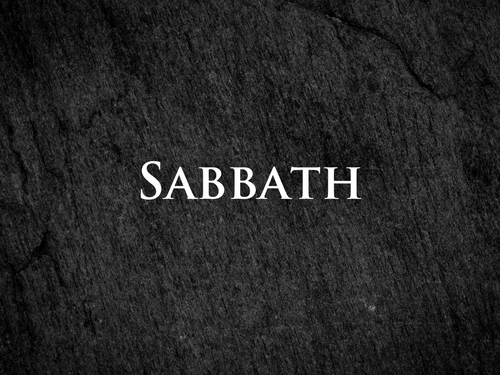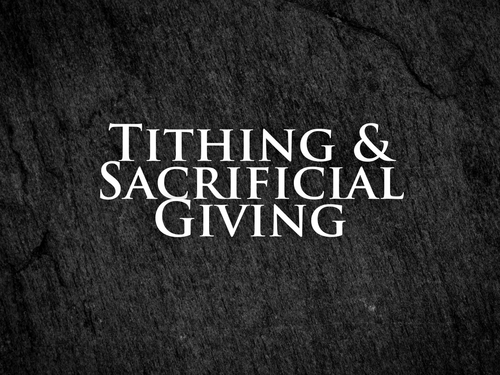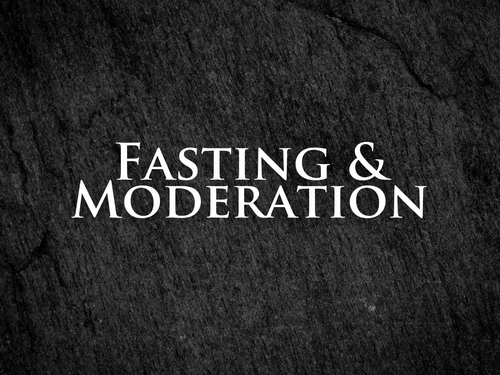Introduction to our Formation Practices
As All Saints mission statement says, the three essential means by which we seek “to live and to love as the Body of Christ in Austin for the world” are worship, spiritual formation, and service. Worship is our primary corporate action and the place where our spiritual formation begins. And what begins in worship is carried out in our day-to-day lives throughout the week. As a church we have adopted ten practices to form our "day-to-day" by which we individually and collectively “work out our own salvation” (Phil. 2:12) that God the Father might “conform us to the image of his Son” (Rom. 8:29).
Word & Prayer
For many of us, prayer feels confusing or burdensome, leaving us wondering if we're "getting it right." Jesus' disciples felt the same way and asked, "Teach us to pray!" Prayer, however, isn't something we initiate—it’s our response to God. As Eugene Peterson says, "God speaks to us; our answers are our prayers." Scripture always precedes prayer. Just as worship begins with God's words from the Psalms before we respond in prayer, so our prayers follow God's word in Scripture. God spoke to Abraham, and Abraham went. Jesus commanded, "Follow me," and the disciples dropped their nets. God speaks, and we respond.
This understanding removes the pressure to "come up with" prayer on our own. We don’t need to wait for inspiration or the right words. Scripture gives us everything we need to pray—whether praying directly from it, in response to it, or guided by it. Prayer springs naturally from Scripture, like plants from well-watered soil. To help you begin incorporating prayer and Scripture into your daily life, we've provided simple resources to get started. Find them here.
This understanding removes the pressure to "come up with" prayer on our own. We don’t need to wait for inspiration or the right words. Scripture gives us everything we need to pray—whether praying directly from it, in response to it, or guided by it. Prayer springs naturally from Scripture, like plants from well-watered soil. To help you begin incorporating prayer and Scripture into your daily life, we've provided simple resources to get started. Find them here.
Smaller Groups
In today's world, true, deep, and life-giving connection is rare. Despite being constantly "connected" through technology, many of us hunger for genuine community. At All Saints, we seek to create spaces where meaningful relationships can flourish—whether through Formation Groups, Bible Studies, Classes, or Support Groups. The Christian journey isn’t walked alone but in community with other Christians. It's through these relationships that we mature as followers of Christ, sharing life together, growing through God's word, and serving alongside one another. In these smaller groups, the nourishing waters of Scripture and the bonds of fellowship help sustain and grow us, equipping us to live and love as Christ's Body in the world.
Smaller Groups at All Saints include:
Smaller Groups at All Saints include:
Ministry Connections
The first step is showing up. That is just what our Ministry Connection Points offer - a place to just show up and begin to enter into the life of the church on a smaller scale. You can connect with these groups directly on their web pages below. All of these gatherings are designed for people to drop in at any point.
Formation Groups
A Formation Group is a type of Smaller Group that meets regularly, often in someone’s home, to share time together, study God’s Word, and pray with and for one another. You can explore our list of Formation Groups here. If you’d like to connect with a group, complete the interest form here, or contact Courtney Johnson if you’re interested in starting your own.
Events
Sometimes the best place to make a new connection is by simply enjoying time with other people. All of our ministries have events throughout the year that are just that - a place to enjoy time with others who share a common interest or participate in a shared activity. Check out our events calendar for the most up-to-date information.
Classes and Services
For those who enjoy connecting in a group while working towards a common goal, we offer classes and service opportunities. We have three Sunday Classes offered for adults:
In addition to our Sunday classes, we often offer semester classes such as:
In addition to our Sunday classes, we often offer semester classes such as:
- Re|Engage (marriage)
- Merge (pre-marital)
- Parenting on Purpose (any stage of parenting)
- SquareOne (first-time moms)
- Raising Saints (moms with children ages 1-5 )
Recovery and Support Groups
We have several groups that exist to uniquely and specifically support those walking through difficult seasons of life. For more information about how to get connected to one of these groups, please click here.
Study
The practice of study deepens our understanding of God and His Word, shaping how we live out our faith. Study is more than memorizing facts—it's meditating on and pondering the truths of Scripture, allowing them to take root in our hearts. This often happens in community, where God speaks through the insights of others, but it also requires solitude, creating space to reflect and hear God's voice.
At All Saints, we offer opportunities to study both individually and with others, recognizing that Christian theology offers wisdom and guidance for our journey of faith. Join one of our Men’s, Women’s, or Spanish Bible Studies, Youth Groups for middle and high school students, or Sunday Classes. You can also explore resources in the All Saints Bookstore or download sermon guides to dig deeper into God’s Word throughout the week.
At All Saints, we offer opportunities to study both individually and with others, recognizing that Christian theology offers wisdom and guidance for our journey of faith. Join one of our Men’s, Women’s, or Spanish Bible Studies, Youth Groups for middle and high school students, or Sunday Classes. You can also explore resources in the All Saints Bookstore or download sermon guides to dig deeper into God’s Word throughout the week.
One-on-One Relationships
Scripture is full of examples of one-on-one relationships in which the spiritual life of the participants was nourished and built up by the wisdom, knowledge, and experience of another Christian. Ruth and Naomi, Elijah and Elisha, Paul and Timothy - these are just some of the ones we can name. But the entire culture of the Ancient Near East was one of apprenticeship, mentorship, and discipleship, sitting at the feet of another who is further along your path to receive guidance or instruction.
At All Saints, we want to help you cultivate some of these life-giving relationships, whether you are facing a particular challenge or simply want another Christian voice speaking truth into your life. There are four forms of one-on-one relationships, depending on your need or desire - Ministerial Counseling, Spiritual Mentorship (Discipleship), Spiritual Direction, and Licensed Professional Counseling. These relationships are by no means exclusive from one another and it is often recommended to maintain them concurrently. For example, it is very common and appropriate for someone in a relationship of Spiritual Direction to also be in Licensed Professional Counseling.
Learn more about these relationships here.
At All Saints, we want to help you cultivate some of these life-giving relationships, whether you are facing a particular challenge or simply want another Christian voice speaking truth into your life. There are four forms of one-on-one relationships, depending on your need or desire - Ministerial Counseling, Spiritual Mentorship (Discipleship), Spiritual Direction, and Licensed Professional Counseling. These relationships are by no means exclusive from one another and it is often recommended to maintain them concurrently. For example, it is very common and appropriate for someone in a relationship of Spiritual Direction to also be in Licensed Professional Counseling.
Learn more about these relationships here.
Sabbath
Sabbath is both a daily and weekly practice. It begins each night when we go to sleep. Sleep is not only a way to rest from the day but also an act of faith — trusting in God, who "neither slumbers nor sleeps." As we rest, we rely on Him to provide the very air we breathe and release the unfinished tasks of the day.
Beyond this daily Sabbath, we are invited into a weekly Sabbath — a day set apart to delight in God's presence and enjoy meaningful time with others made in His image. Below, we've curated some resources to help you engage in this practice:
Beyond this daily Sabbath, we are invited into a weekly Sabbath — a day set apart to delight in God's presence and enjoy meaningful time with others made in His image. Below, we've curated some resources to help you engage in this practice:
Retreat
Retreats offer an extended and intentional time for renewal — a deeper version of daily and weekly practices of rest, reading, and prayer. They provide space to listen, learn, pray, be silent, and experience God's grace, whether alone or with others. All Saints typically hosts retreats for women, men, youth, and young adults throughout the year, but they can also be meaningful when done individually or with a small group of friends.
Tithing & Sacrificial Giving
Tithing or sacrificial giving is a tangible reminder that we're not ultimately to live inward facing lives, but outward facing ones, directed toward God and others. Sacrificial giving is a discipline to make us more generous, joyful, caring and gracious people. The paradox of Christianity is that we are more blessed, satisfied, and fulfilled when we give, rather than when we receive. It was true of our Savior and it’s true of us. The goal of sacrificial giving is to more fully display the generosity of Jesus to us in our giving to others.
If you have not made tithing to the General Fund a regular practice, we invite you to begin there. All Saints relies 100% on the faithfulness of its members, through their tithes and offerings, to continue the mission to which God has called us.
If you have not made tithing to the General Fund a regular practice, we invite you to begin there. All Saints relies 100% on the faithfulness of its members, through their tithes and offerings, to continue the mission to which God has called us.
Fasting & Moderation
Fasting is a spiritual practice that invites us to give up something—often food—to experience hunger or lack, awakening a deeper thirst for the One who truly fills us. Unlike a fad diet for physical benefits, fasting shifts our focus back to God, reminding us that in Him, there is no lack. It also teaches moderation, helping us learn self-denial and live intentionally as followers of Jesus who are called to "take up our cross."
If you're new to fasting, consider starting small by fasting for part of a day or skipping specific meals. Consult your doctor if you have any health concerns. Fasting with family or friends can also provide encouragement and accountability. For guidance, Fasting by Scot McKnight is a helpful resource.
If you're new to fasting, consider starting small by fasting for part of a day or skipping specific meals. Consult your doctor if you have any health concerns. Fasting with family or friends can also provide encouragement and accountability. For guidance, Fasting by Scot McKnight is a helpful resource.
Hospitality
Hospitality is a beautiful expression of love, rooted in God's lavish, welcoming grace. It’s a way of embodying the self-giving love that defines us as members of the Body of Christ. True hospitality goes beyond simply receiving from others—it invites us to give generously of our time, space, and resources, opening our lives to neighbors, friends, and even strangers. While hosting meals for friends is certainly part of hospitality, it’s also found in small, everyday actions—initiating a conversation with a visitor at church, listening attentively to a neighbor, or offering your time to a friend in need. In the Bible, hospitality often begins with shared meals, a sign of shared life. Consider inviting someone over for a meal or delivering food to someone facing a challenging season.
At All Saints, we value hospitality as an essential aspect of living out our faith. We host Missions Conferences centered on the theme of hospitality, exploring how God calls us to love and welcome others both locally and globally. Additionally, Meal Trains are coordinated for those experiencing major life events, such as surgery or the arrival of a new baby. Parish emails provide opportunities to support others by bringing a meal. However you practice it, hospitality reflects God's love and opens us to encounter His presence through one another. To further explore the practice of hospitality, we recommend Making Room: Recovering Hospitality as a Christian Tradition.
At All Saints, we value hospitality as an essential aspect of living out our faith. We host Missions Conferences centered on the theme of hospitality, exploring how God calls us to love and welcome others both locally and globally. Additionally, Meal Trains are coordinated for those experiencing major life events, such as surgery or the arrival of a new baby. Parish emails provide opportunities to support others by bringing a meal. However you practice it, hospitality reflects God's love and opens us to encounter His presence through one another. To further explore the practice of hospitality, we recommend Making Room: Recovering Hospitality as a Christian Tradition.
Service
"For even the Son of Man came not to be served but to serve, and to give his life as a ransom for many." — Mark 10:45
The Gospel of Mark reminds us that Christ, from His incarnation to His resurrection, lived a life of self-sacrificial service. His life and death were acts of obedience and devotion to His Father in heaven, serving as the ultimate example for us to follow. The call to servanthood in Scripture is primarily a call to serve God, which is embodied through our love and service to others. Christian service is not merely a to-do list but a posture—a stance of humility modeled by Christ Himself. The apostle Paul often described himself as a "bond-servant of Christ," adopting the position of the lowest servant, ready and eager to serve everyone. This humility flowed from his understanding that he had first been served by Christ. As we pour ourselves out in love and service, we create space to be filled once again with the self-sacrificial love of God, enabling us to serve with joy and gratitude.
The Gospel of Mark reminds us that Christ, from His incarnation to His resurrection, lived a life of self-sacrificial service. His life and death were acts of obedience and devotion to His Father in heaven, serving as the ultimate example for us to follow. The call to servanthood in Scripture is primarily a call to serve God, which is embodied through our love and service to others. Christian service is not merely a to-do list but a posture—a stance of humility modeled by Christ Himself. The apostle Paul often described himself as a "bond-servant of Christ," adopting the position of the lowest servant, ready and eager to serve everyone. This humility flowed from his understanding that he had first been served by Christ. As we pour ourselves out in love and service, we create space to be filled once again with the self-sacrificial love of God, enabling us to serve with joy and gratitude.
Ways to Serve
In the Church - Sundays and Special Events
All Saints relies on over 150 volunteers to make Sunday mornings possible. That means there are opportunities for every member to serve and utilize their gifts in some capacity. You can volunteer as an usher, greeter, scripture reader, children's helper, Small Saints or Sunday school teacher, and more. If you're interested in serving, please complete our interest form so we can better understand your service area preferences.
Missions
Get involved in mission opportunities both locally and globally, sharing Christ's love through word and deed. We support, volunteer with, and partner with numerous local and international ministries in Austin, the United States, and around the world. You can see our full list of ministry partners here. If you want to connect further or have any questions, please contact our Missions Coordinator, Brooke Crockett.
Ministry Opportunities
We have many ways for you to plug in and serve, whether that’s setting up for special events, teaching, volunteering as a helper, serving at VBS, participating in community events, and more.
If you're interested, please complete our interest form to get connected. For specific questions about serving, reach out to the ministry contact listed on this page.
If you're interested, please complete our interest form to get connected. For specific questions about serving, reach out to the ministry contact listed on this page.
Special Service Projects
Participate in service initiatives focused on meeting the needs of our city and community, including churchwide service days. These projects also take place within our demographic ministries, such as 50+, Women, Men, Unidos, Youth, Young Adults, and College, providing meaningful ways to serve alongside one another. Check out upcoming opportunities on the Events Calendar to get involved.
Church Plants
Planting new churches is central to All Saints’ mission to serve Austin and beyond. This vision became a reality in 2015 with the planting of Grace+Peace in north-central Austin, followed by Resurrection Presbyterian in northwest Austin in 2024. We aim to continue sending people out to establish new churches throughout the greater Austin area. As part of the Reach South Texas network, we collaborate to plant churches across central and south Texas. Learn more about church planting here.
Previous Sermon Series: Formed in Christ
During this season of Epiphany, All Saints is highlighting our spiritual formation practices. Learn more by exploring the series below.
Ash Wednesday Meditation
Mar 5, 2025 • Rev. Josh Keller
Service
Mar 2, 2025 • Rev. Brent Baker
Hospitality
Feb 23, 2025 • Rev. Will Stockdale
Fasting
Feb 16, 2025 • Rev. Tim Frickenschmidt
Sabbath Rest
Feb 9, 2025 • Rev. Josh Keller
Sacrificial Giving
Feb 2, 2025 • Rev. Tim Frickenschmidt
Smaller Groups of Forgiven Friends
Jan 26, 2025 • Rev. Tim Frickenschmidt
Called by Name
Jan 19, 2025 • Rev. Brent Baker
Hearing the Voice from Heaven
Jan 12, 2025 • Rev. Josh Keller










